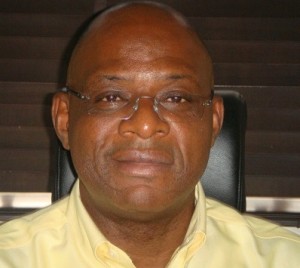
Barr. Temisan Omatseye is a former Director General of the Nigerian Maritime Administration and Safety Agency (NIMASA) and the President of African Ship owners Association (ASA). In this interview with MMS Plus he bears his mind on several pertinent issues plaguing the nation’s maritime sector.
Kenneth Jukpor writes…

Excerpts.
The Cabotage Act hasn’t been productive, however there is an assertion that the Cabotage Act isn’t the problem but its implementation. What is your view on this?

Yes, I maintain this position. There is nothing wrong with the Cabotage Act and the problem is not only implementation but the enforcement of the Act. I think the Act covers enough of what is required, so what needs to be focused on now is enforcement. As private sector people and as lawyers, we need to find a way to advise the government on how the enforcement can be successfully and properly done within the ambits of the law.

Nigeria’s former president, Olusegun Obasanjo has said that the government should not fund a new national carrier. Is that the way to go?
I agree with Obasanjo on this because I believe the private sector is strong enough to drive it. What we need is the political will and an enabling environment. Another thing that is key is for the government to become more protectionist. The government has the cargo but as a result of its lackluster attitude it has allowed foreign ship owners to take over our cargo. Once we begin to ensure the cargoes are available I can assure you that the issue of capacity building that the minister is talking about is not difficult.
We need to begin to look at the long term impact of having a national carrier. I do agree that the government shouldn’t bring in money but the government must create an enabling environment. The government can put guarantees in place with other nations and international companies to ensure that in event of non-payment, like what is happening in the Cape Town convention with the aircraft. The Nigerian government should create a government-to-government agreement to say in event of non-payment it would make the asset available to the lender. The biggest fear of these people is how they would get back their property if the Nigerian does not pay. This is the problem and if the government can assure the lenders, there is enough business to keep us going. We really don’t need government money, the Cabotage Vessel Financing Fund (CVFF) and maybe a little bit of fund would be enough.
The Cabotage Vessel Financing Fund (CVFF) has been a very controversial issue, what is the purpose of the CVFF and how is it been used?
The intent of the CVFF was to provide money for indigenous people to buy vessels but the problem we have is very simple. The Cabotage Act says clearly that there is be a CVFF and the Act also says that the disbursement of this fund would be based on the guideline issued by the Minister of Transportation. We have been going up and down this line since 2003 and not a kobo has been released from the CVFF. This simply means that the guideline which has been issued is faulty. Why don’t we adopt more modern systems of financial transactions? We need to review these things because the money isn’t the government’s but for ship owners. We need to agree on how this money is to be released without any risk attached to the government. We can even use the CVFF to create a maritime development bank and address other issues.
Search and Rescue is a key component of maritime operations, is Nigeria Maritime Administration And Safety Agency (NIMASA) getting it right?
NIMASA isn’t getting search and rescue right. Where is the helicopter, the Agusta 13? That Agusta 13 was an aircraft that we paid 17million euros for and the aircraft was supposed to be used for search and rescue operations. Since we bought that aircraft it has not flown one day. The intention was to put a camera under it and the Navy has that camera. The plan was to ensure they have live-feeds which can be given to the resource centre. The helicopter could be used for search and rescue operations as well as surveillance. The aircraft can fly every morning across the anchorage, taking pictures so that if there are changes within the environ NIMASA is able to notice it and this helps in fostering maritime safety and security.
What is the biggest challenge facing the Nigerian maritime industry at the moment and what solutions would you proffer?
The structure of NIMASA is a huge problem. NIMASA needs to be restructured. The first thing is to professionalize the agency; it shouldn’t be a place for teachers but maritime professionals. The problem with our educational system here in Nigeria is that people only learn what the teachers teach. If the teachers teach rubbish, that is what the students will learn. Similarly the maritime administration should be properly structured with a career line set for the people who are going to work there. This would ensure that they are trained in that line. A person who comes into NIMASA as a first year university student should know that when he is 40 or 45 years old, he should be an Assistant Director or a Deputy Director.
There shouldn’t be cases of moving people without experience into sensitive positions at the agency. We need to look at a situation where a person has a clear-cut job description and a clear-cut career path within the agency so the agency knows that every two years this person goes for a particular training. This helps the individual as well as the training programmed of the agency. It also ensures that NIMASA wouldn’t have to source for Director Generals (DG) outside the agency but would have developed in-house people who can drive the agency to the next level.
The Nigerian Seafarers Development Programme (NSDP) was initiated to lead the nation towards developing such capacity. How has the NSDP fared?
The issue of NSDP is a very wonderful programme, but unfortunately the strategy to continue the programme wasn’t there. I sent the first set of cadets to Alexander in Egypt through NSDP. There are over 2,000 people abroad on the NSDP and several others have returned to Nigeria. The issue is that there aren’t vessels for these people to get the requisite seatime experience and after one or two years most of these people would forget what they were taught in school, thus, the initiative becomes a waste of time.
These cadets ought to be onboard ships right now to learn the rudiments of the sea and get certification that will enable them become officers. It takes at least another six years because they work on the ships a bit and go to school. That is the way an officer is developed. The way it is at the moment, you cannot use your degree as a nautical engineer to become an officer because you need to get your practical training onboard the ships.
Nigerian cargoes continue to be routed to Lome for STS operations and you have stated that this is as a result of CBN’s forex policy. However, Mrs. Uju Ifejika attributed the problem to the draft level of the nation’s port. How significant is this and why aren’t NNPC and CBN representatives present at maritime summits?
The bottom line on the issue of STS is not an issue of draft. The draft from offshore Lagos into Apapa, the Unilever axis, is deep enough for 25000 to 30000 tonne vessels to come in. Where we have a challenge with draft restrictions is the new areas such as Ibafo and the rest.
What happens is that if you decide to go to these ports, you bring your vessels to offshore Lagos and you do an STS to load about 8000- 10000 tonnes if it gives you 6.1 or 6.2 meters draft to go to Ibafo. If she was bringing a vessel to the tank farm, then she should tell us where she was going to discharge and she should know the draft level of those areas.
I don’t know why the NNPC and CBN officials are never present at maritime summits.
 MMS PLUS NG – Maritime, Aviation, Business, Oil and Gas News Online Newspaper with coverage in Maritime, Oil and Gas, Aviation, Power and Energy as well as Financial News
MMS PLUS NG – Maritime, Aviation, Business, Oil and Gas News Online Newspaper with coverage in Maritime, Oil and Gas, Aviation, Power and Energy as well as Financial News









